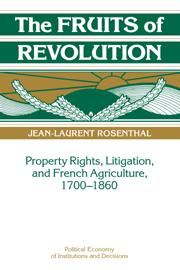Book contents
- Frontmatter
- Contents
- List of tables, figures, and maps
- Series editors' preface
- Preface
- 1 Introduction
- PART I HISTORY AND ECONOMICS
- PART II DRAINAGE AND IRRIGATION
- PART III PROPERTY RIGHTS AND LITIGATION UNDER ABSOLUTISM
- Appendix 1 Wages, land prices, and interest rates
- Appendix 2 Estimating rates of return
- Appendix 3 Theoretical proofs
- Bibliography
- Index
Series editors' preface
Published online by Cambridge University Press: 27 March 2010
- Frontmatter
- Contents
- List of tables, figures, and maps
- Series editors' preface
- Preface
- 1 Introduction
- PART I HISTORY AND ECONOMICS
- PART II DRAINAGE AND IRRIGATION
- PART III PROPERTY RIGHTS AND LITIGATION UNDER ABSOLUTISM
- Appendix 1 Wages, land prices, and interest rates
- Appendix 2 Estimating rates of return
- Appendix 3 Theoretical proofs
- Bibliography
- Index
Summary
This series, The Political Economy of Institutions and Decisions, is built around attempts to answer two central questions: How do institutions evolve in response to individual incentives, strategies, and choices, and how do institutions affect the performance of political and economic systems? The scope of the series is comparative and historical rather than international or specifically North American, and the focus is positive rather than normative.
This books confronts a historic debate over the influence of the French Revolution on economic change in France. For some scholars, the French Revolution was a fundamental revolution that, by altering the political and economic order, basically changed the direction of French society and economy. For others, the Revolution was simply a violent interruption that, in the long run, had little impact on the direction of French society. In order to probe this issue, Jean-Laurent Rosenthal assesses the differential performance of French agricultural sectors before and after the Revolution. Specifically, he examines irrigation and drainage changes to document both the cost of making such developments in the Old Regime and the cost of making them after the Revolution. The result not only provides detailed substance to the debate about whether the French Revolution was indeed a fundamental revolution but also establishes a new empirical underpinning for the whole property rights literature. This study provides a solid basis for evaluating the way alterations in property rights influence the performance of economies.
- Type
- Chapter
- Information
- The Fruits of RevolutionProperty Rights, Litigation and French Agriculture, 1700–1860, pp. ix - xPublisher: Cambridge University PressPrint publication year: 1992



